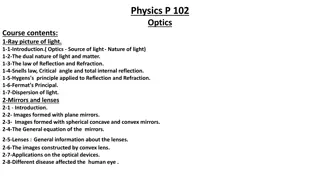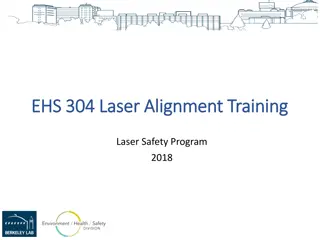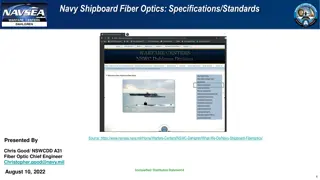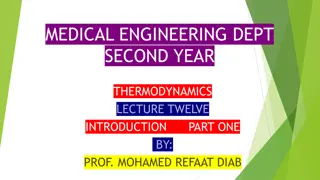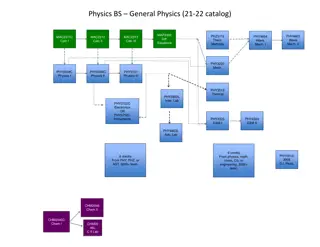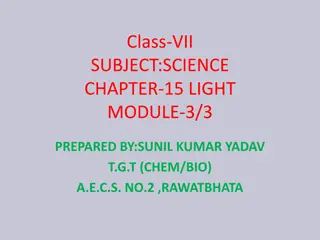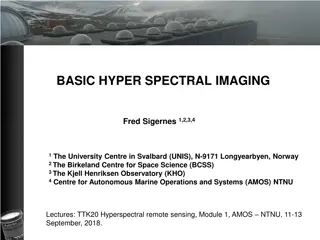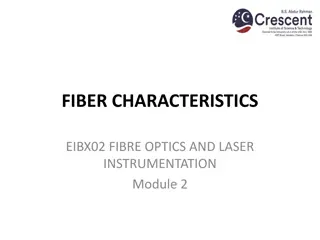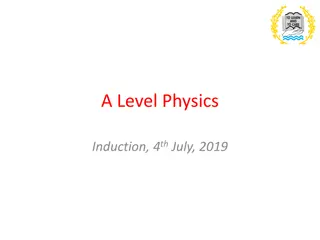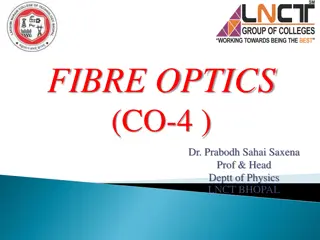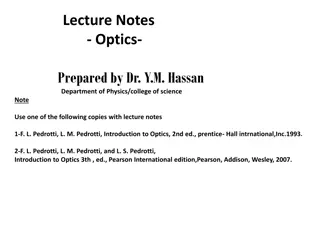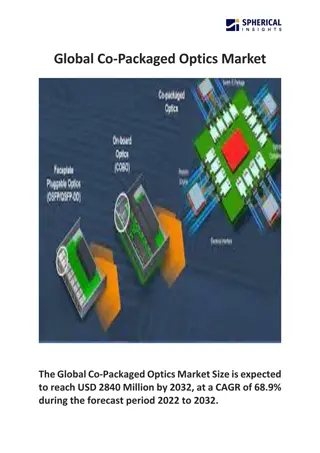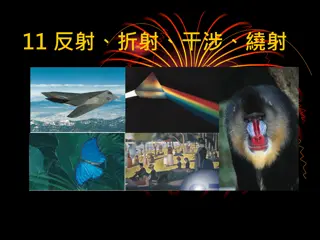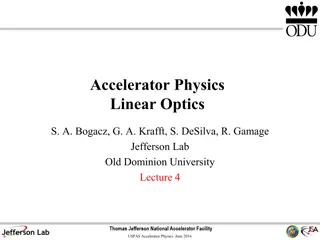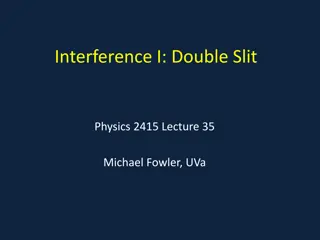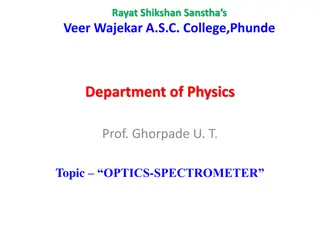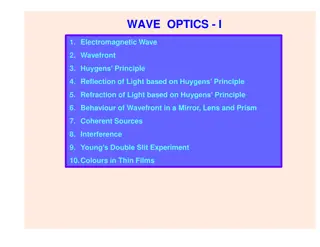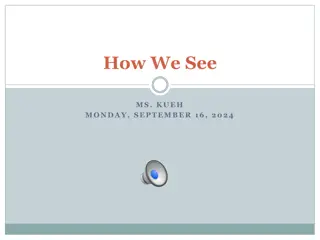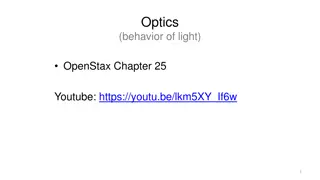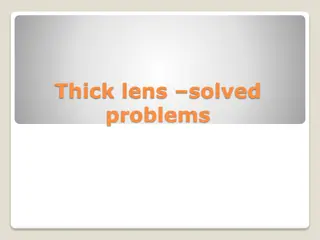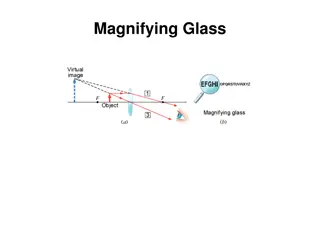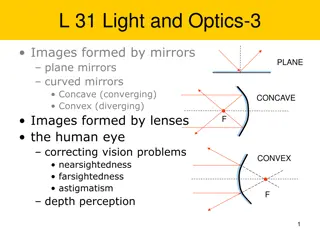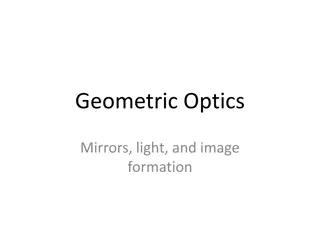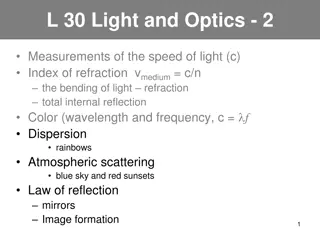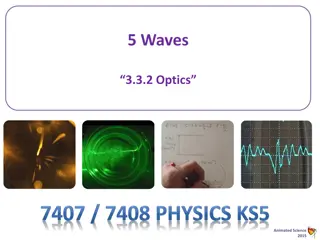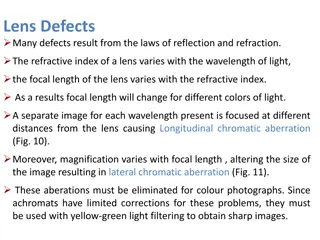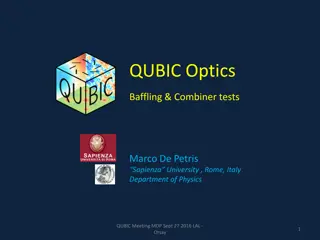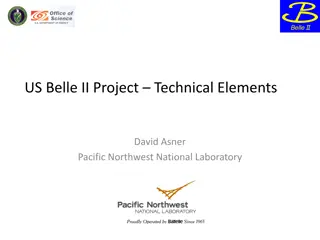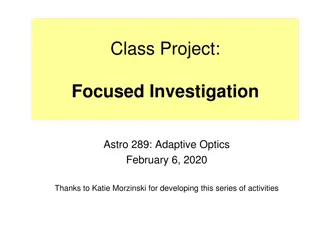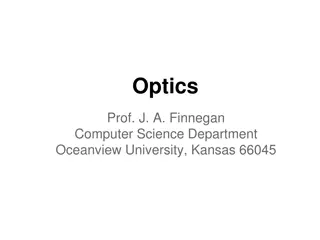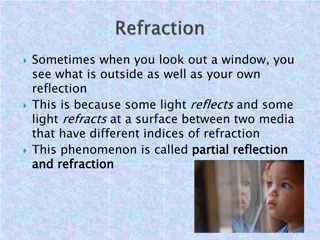Exploring Optics: Light Behavior and Properties
Optics studies the behavior of light, its interaction with matter, and the construction of instruments using or detecting light. From the dual nature of light to the laws of reflection and refraction, this branch of physics delves into topics like mirrors, lenses, and the dispersion of light. Practi
2 views • 15 slides
TELECOMMUNICATIONS MEDIA
Telecommunications is the electronic transmission of information over distances, including voice calls, data, text, images, and video. It encompasses a range of technologies like fiber optics, satellites, telephones, and the Internet. Components of a telecommunications network include terminals, int
5 views • 13 slides
Laser Alignment Training for Safety
This laser alignment training program focuses on exercises like wedge window alignment and beam splitter cube alignment to prevent laser eye injuries and control reflections. It covers techniques for safely setting up optics and aligning laser beams in a controlled environment.
0 views • 14 slides
Navy Shipboard Fiber Optics Specifications & Standards: Recent Updates
Detailed specifications and standards for fiber optic systems on naval ships are provided, including documents such as MIL-STD-2052A, MIL-STD-2042C, MIL-STD-1678, MIL-PRF-85045G, and more. The content outlines ongoing revisions and new projects, publication targets, and updates on various fiber opti
0 views • 6 slides
Understanding Maxwell Equations in Thermodynamics
In thermodynamics, Maxwell equations are derived using Euler's reciprocity relation. They involve characteristic functions such as internal energy, free energy, enthalpy, and Gibbs free energy, along with parameters like temperature, entropy, pressure, and volume. These equations form the foundation
0 views • 15 slides
Physics Bachelor's Degree Specializations Overview
Explore different specializations within a Physics Bachelor's degree program for the 2021-2022 academic year, including general physics, astronomy, computational physics, materials physics, and optics and lasers. Each specialization offers a unique set of courses and opportunities for students inter
2 views • 9 slides
Understanding Reflection and Refraction of Light
Explore the fascinating world of reflection and refraction of light, delving into concepts such as the laws of reflection, real vs. virtual images, characteristics of mirror-formed images, and the types of spherical mirrors - concave and convex. Discover how light behaves when it interacts with diff
1 views • 23 slides
Understanding Light and Lenses: Exploring Colors and Images Formed
Explore the fascinating world of light and lenses in this module. Discover how lenses work, types of lenses like convex and concave, images formed by lenses, and the dispersion of sunlight into seven colors. Engage in activities showcasing the colors of sunlight and delve into the enchanting realm o
1 views • 10 slides
Electronics and Telecommunication Technology Programs Overview
The Electronics Technology program provides students with academic courses, technical skills training, and practical experience to become electronics technicians, focusing on troubleshooting and repairing electronic appliances. Similarly, the Telecommunication Technology program prepares students fo
1 views • 16 slides
Electronics and Telecommunication Technology Programs Overview
The Electronics Technology program equips students with the necessary skills and knowledge to excel as technicians in the electronics industry. From troubleshooting to repairing electronic equipment, the program covers a wide range of practical experiences. On the other hand, the Telecommunication T
0 views • 16 slides
Understanding Basic Concepts of Hyperspectral Imaging and Spectroscopy
Exploring the fundamental principles of hyperspectral imaging and spectroscopy, this content covers topics such as interference, diffraction, spectrometer workings using diffraction gratings, and wave properties. Lectures by Adjunct Professor Fred Sigernes delve into topics like basic spectroscopy,
0 views • 21 slides
Understanding Fiber Characteristics in Fiber Optics and Laser Instrumentation
This module explores the mechanical characteristics such as strength, static fatigue, and dynamic fatigue of glass fibers in fiber optics. It discusses the cohesive bond strength of glass fibers, static fatigue under humid conditions, and dynamic fatigue during installation and operation. The transm
0 views • 34 slides
A Level Physics Course Outline and Structure
The A Level Physics course is outlined, detailing the topics covered in Year 12 and A2. The course structure includes three exams at the end of the A2 course and a practical certificate of competence. Topics range from particles and radiation to fields, nuclear physics, and practical skills assessme
0 views • 16 slides
Overview of Optical Fibre Technology and Applications
Optical fibre technology, spearheaded by Dr. Prabodh Sahai Saxena, revolutionizes communication systems through light transmission. This cutting-edge technology utilizes fibre optics made of glass or plastic to carry light signals, offering advantages like high bandwidth, low signal loss, and no ele
0 views • 20 slides
Development Update for LhARA Steering Group Meeting - 31st January 2020
Overview of the preparations and progress made for the pre-CDR of LhARA project discussed during the Steering Group Meeting on 31st January 2020. Highlights include interface design between laser and proton capture, end-to-end simulations, and advancements in beam optics design using various simulat
1 views • 18 slides
Journey Through Optics: From Ancient Discoveries to Modern Applications
Explore the fascinating history of optics, from the pioneering work of Alhazen in the Middle Ages to the revolutionary experiments of Newton, Young, and Maxwell in the 18th and 19th centuries. Discover how the wave-particle duality of light has shaped our understanding of optics and led to groundbre
5 views • 14 slides
Global Co-Packaged Optics Market
The Global Co-Packaged Optics Market Size is expected to reach USD 2840 Million by 2032, at a CAGR of 68.9% during the forecast period 2022 to 2032.\n\n
1 views • 8 slides
Understanding Light: Reflection, Refraction, and Interference in Optics
Explore the fascinating world of optics with topics ranging from the principles of reflection and refraction to the intricate phenomenon of interference. Delve into the concepts of index of refraction, chromatic dispersion, rainbows, and more. Discover the secrets behind the blue-green color of a Mo
0 views • 15 slides
Laboratory for Teaching Laser and Atomic Physics at AAPT Conference
Explore the laboratory curriculum for teaching laser and atomic physics developed by Joseph E. Wiest at West Virginia Wesleyan College. The course encompasses electro-optics, quantum models, optics concepts, laser operations, and experimental objectives. Discover the history and applications of vari
0 views • 41 slides
Linear Beam Optics and Particle Motion in Accelerator Physics
Explore the fundamental concepts of linear beam optics and particle motion in accelerator physics, covering topics such as design trajectory, path length, phase advance, transfer matrix, and more. Understand the intricacies of designing accelerators and the mathematical representations involved in o
0 views • 78 slides
Understanding Optics and Magnification in Physics
Today's lecture covers a brief review of optical instruments, Huygens principle, refraction phenomena, and Young's double slit experiment. The session delves into magnifying glasses, magnification power definition, astronomical telescopes, and simple and compound microscopes. Key concepts include th
7 views • 20 slides
Optics Spectrometer Setup at Rayat Shikshan Sanstha's Veer Wajekar A.S.C. College
Construction and setup guide for an optics spectrometer at Rayat Shikshan Sanstha's Veer Wajekar A.S.C. College, including details on the telescope, collimator, and prism table. Instructions cover aligning the telescope, setting up the collimator, and positioning the spectrometer table. Steps are pr
7 views • 10 slides
Understanding Wave Optics Principles
Explore electromagnetic waves, wavefronts, Huygens' principle, reflection, and refraction of light based on these principles. Learn about the behavior of wavefronts in mirrors, lenses, and prisms, as well as coherent sources, interference, and the Young's double-slit experiment. Dive into the world
1 views • 34 slides
Meticulous Research® Forecasts Global Fiber Optics Market to Reach $7.9 Billion by 2030
Fiber Optics Market by Type (Single, Multi-mode), Material (Glass, Plastic), Deployment, Application (Internet & Computer Networking, Cable Television), End-user (IT & Telecommunications, Healthcare & Pharmaceuticals), and Geography - Global Forecast
1 views • 4 slides
Exploring the Fascinating World of Sight: Light, Optics, and Eye-Brain Connection
Delve into the intricate workings of how we perceive the world through sight. From understanding the behavior of light in optics to the vital role of the eye-brain connection, embark on a journey through visuals, optical illusions, and thought-provoking insights. Meet Eyevan and unravel the mysterie
0 views • 42 slides
Understanding the Behavior of Light in Optics
Light in optics can be described as a wave, a particle, or a ray. The ray model of light explains how light travels in straight lines unless it interacts with a surface or changes media. By tracing rays back, we can locate objects and understand how light interacts with matter at boundaries between
0 views • 39 slides
Optics Solved Problems: How to Solve for Focal Lengths
This content provides solutions to various optics problems involving thick lenses, double convex lenses, bi-convex lenses, compound lenses, and more. It covers topics such as identifying principal and focal points, calculating image distances, determining the effective focal length of lens systems,
1 views • 12 slides
Understanding and Quantifying Bessel Beams in Fiber Optics
To analyze Bessel beams in fiber optics, a fitting algorithm must be coded to quantify the beam. The process involves defining combinations of Bessel functions, finding the best fit through iterations, and addressing the substantial computational challenge posed by the large number of calculations.
0 views • 13 slides
Understanding The Optics of Vision: From Magnifying Glasses to Eyeball Anatomy
Explore the fascinating world of optics and vision, from the use of diverging lenses as magnifying glasses to the intricate anatomy of the human eye. Learn about image formation in cameras, the refractive power of lenses, nearsightedness, and prescription lenses for correcting vision issues such as
0 views • 16 slides
Exploring Light, Optics, and Vision Correction
Understanding images formed by mirrors, lenses, and the human eye in the context of light and optics. Covering concepts like reflection, refraction, concave and convex mirrors, types of lenses, correcting vision issues, and laws governing the behavior of light.
0 views • 22 slides
Understanding Geometric Optics: Mirrors, Light, and Image Formation
Delve into the world of geometric optics as you explore how light rays form images with optical instruments, understand the ray model of light, and discover the laws of reflection and refraction. From reflection and refraction on plane mirrors to key terms like specular reflection and virtual images
0 views • 55 slides
Exploring Light and Optics: Reflection, Refraction, and Phenomena
Explore the fascinating world of light and optics, delving into topics like the speed of light, index of refraction, reflection, refraction, dispersion, rainbows, atmospheric scattering, and more. Understand how different colors of light are refracted, leading to phenomena such as rainbows and blue
0 views • 23 slides
Understanding Optics: Refraction and Optical Fibres in Science
Explore the concepts of refraction and optical fibres in this comprehensive science lesson. Learn about refractive index, Snell's law, total internal reflection, and the role of cladding in optic fibres. Enhance your understanding of pulse broadening, absorption, and critical angles in optics throug
0 views • 33 slides
Understanding Lens Defects and Aberrations in Optics
Lens defects and aberrations in optics, such as chromatic and spherical aberrations, are caused by the laws of reflection and refraction. They lead to issues like longitudinal and lateral chromatic aberration, as well as spherical aberration. Proper correction methods, like using achromats with yell
0 views • 24 slides
QUBIC Optics Baffling & Combiner Tests at Sapienza University, Rome
The QUBIC project at Sapienza University in Rome focuses on optics subsystems for shielding and combiner tests for the Technological Demonstrator and Final Instrument. Details include the current shielding baseline, preliminary drawings, and structural analysis of the ground shield. Images and descr
0 views • 33 slides
US Belle II Project Technical Elements by David Asner at Pacific Northwest National Laboratory
The US Belle II Project involves delivering key systems to KEK KLM, including iTOP and readout systems. WBS 1.02 managed by Jim Fast focuses on iTOP optics specifications, procurement, and acceptance tests. Material selection uses Corning 7980 fused quartz silica, meeting specific parameters. All op
0 views • 25 slides
Illumination Optics Design for DLP470TP with SBM-40-LC LED
Explore the detailed illumination optics design for DLP470TP incorporating the SBM-40-LC LED, including focus lenses, collimating lenses, aperture dimensions, ray tracing diagrams, and more. Various optical part numbers from different manufacturers are also mentioned, along with specific placements
0 views • 23 slides
Exploring Adaptive Optics Systems in Astronomy: Comparative Analysis of AO Systems for HR 8799 Planetary System
Delve into the world of adaptive optics (AO) systems through a focused investigation on imaging the HR 8799 planetary system. Compare and contrast different AO systems, discuss science goals and design choices, and analyze observational details and results. Explore which AO system is optimal for HR
0 views • 27 slides
Innovative Optics Solutions for Special Forces Challenges
Optics Professor J. A. Finnegan from Oceanview University in Kansas presents cutting-edge solutions to the dual challenges faced by Special Forces - detecting enemies and concealing themselves. Through the use of LASER and DASER technologies, augmented by LEDs and DEDs, the devices follow principles
0 views • 22 slides
Understanding Reflection and Refraction Phenomena in Optics
Reflection and refraction are fundamental phenomena in optics, occurring when light encounters surfaces with different indices of refraction. This results in partial reflection and refraction, with the amount of each depending on the angle of incidence. Beyond a critical angle, total internal reflec
0 views • 12 slides
